2019英语四级听力短对话练习题(42)
2019年大学英语四级听力短对话练习(20)

2019年大学英语四级听力短对话练习(20)11.W: This crazy bus schedule has got me completely confused. I can’t figure out when my bus to Cleveland leaves?M:Why don’t you just go to the ticket window and ask?Q: What does the man suggest the woman do?12.W: I really enjoyed the TV special about drafts last night. Did you get home in time to see it?W: Oh, yes, but I wish I could have stayed awake long enough to see the whole thing.Q: What does the man mean?11.答案:B) Go and ask the staff.12.答案:A) He fell asleep in the middle of the TV program.11.女:这该死的公共汽车时间表,我居然找不到开往克利夫兰的车几点出发!男:为什么不直接去售票窗口问问呢?问:这个男人建议女人怎么做?答:从答复中:go directly to the window and ask 能够看出应该是直接去问工作人员12.女:我真的很喜欢昨天的特别电视集锦节目。
你按时到家看它了吗?男:是的,不过我倒希望自己能醒着看完问:这个男的是什么意思?答:从回答中的第一个词yes,能够知道男的按时到家了;但随后的stay awake (保持清醒)来看,应该说是没看完就睡着了。
2019年6月份英语四级考试真题带答案听力原文
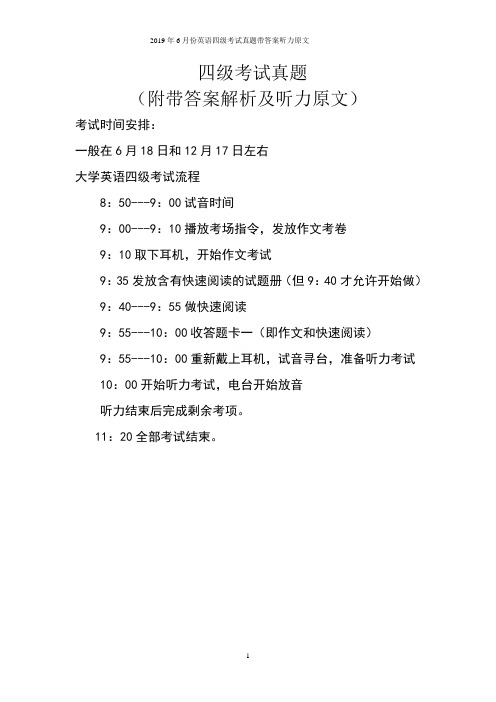
四级考试真题(附带答案解析及听力原文)考试时间安排:一般在6月18日和12月17日左右大学英语四级考试流程8:50---9:00试音时间9:00---9:10播放考场指令,发放作文考卷9:10取下耳机,开始作文考试9:35发放含有快速阅读的试题册(但9:40才允许开始做)9:40---9:55做快速阅读9:55---10:00收答题卡一(即作文和快速阅读)9:55---10:00重新戴上耳机,试音寻台,准备听力考试10:00开始听力考试,电台开始放音听力结束后完成剩余考项。
11:20全部考试结束。
Part ⅠWriting (30minutes)Directions: For this part, you are allowed 30 minutes to write a short essay entitled Excessive Packaging following the outline given below. You should write at least 120 words but no more than 180 words.1.目前许多商品存在过度包装的现象2.出现这一现象的原因3.我对这一现象的看法和建议On Excessive PackagingPart Ⅱ Reading Comprehension(Skimming and Scanning)(15minutes)Directions: In this part, you will have 15 minutes to go over the passage quickly and answer the questions on Answer sheet 1. For questions 1-7,choose the best answer from the four choices marked A),B),C)and D). For questions 8-10,complete the sentences with the information given in the passage.Small Schools RisingThis year’s list of the top 100 high schools shows that today, those with fewer students are flourishing.Fifty years ago, they were the latest thing in educational reform: big, modern, suburban high schools with students counted in the thousands. As baby boomers(二战后婴儿潮时期出生的人) came of high-school age, big schools promised economic efficiency. A greater choice of courses, and, of course, better football teams. Only years later did we understand the trade-offs this involved: the creation of excessive bureaucracies(官僚机构),the difficulty of forging personal connections between teachers and students.SAT scores began dropping in 1963;today,on average,30% of students do not complete high school in four years, a figure that rises to 50% in poor urban neighborhoods. While the emphasis on teaching to higher, test-driven standards as set in No Child Left Behind resulted in significantly better performance in elementary(and some middle)schools, high schools for a variety of reasons seemed to have made little progress.Size isn’t everything, but it does matter, and the past decade has seen a noticeable countertrend toward smaller schools. This has been due ,in part ,to theBill and Melinda Gates Foundation, which has invested $1.8 billion in American high schools, helping to open about 1,000 small schools-most of them with about 400 kids each with an average enrollment of only 150 per grade, About 500 more are on the drawing board. Districts all over the country are taking notice, along with mayors in cities like New York, Chicago and San Diego. The movement includes independent public charter schools, such as No.1 BASIS in Tucson, with only 120 high-schoolers and 18 graduates this year. It embraces district-sanctioned magnet schools, such as the Talented and Gifted School, with 198 students, and the Science and Engineering Magnet,with383,which share a building in Dallas, as well as the City Honors School in Buffalo, N.Y., which grew out of volunteer evening seminars for students. And it includes alternative schools with students selected by lottery(抽签),such as H-B Woodlawn in Arlington, Va. And most noticeable of all, there is the phenomenon of large urban and suburban high schools that have split up into smaller units of a few hundred, generally housed in the same grounds that once boasted thousands of students all marching to the same band.Hillsdale High School in San Mateo, Calif, is one of those, ranking No.423—among the top 2% in the country—on Newsweek’s annual ranking of America’s top high schools. The success of small schools is apparent in the listings. Ten years ago, when the first Newsweek list based on college-level test participation was published, only three of the top 100 schools had graduating Classes smaller than 100 students. This year there are 22. Nearly 250 schools on the full ,Newsweek list of the top 5% of schools nationally had fewer than 200 graduates in 2007.Although many of Hillsdale’s students came from wealthy households, by the late 1990 average test scores were sliding and it had earned the unaffectionate nickname (绰号) “Hillsjail. ” Jeff Gilbert. A Hillsdale teacher who became principal last year, remembers sitting with other teachers watching students file out of a graduation ceremony and asking one another in astonishment, “How did that student graduate?”So in 2003 Hillsdale remade itself into three “houses,” romantically named Florence, Marrakech and Kyoto. Each of the 300 arriving ninth graders are randomly(随机地) assigned to one of the houses. Where they will keep the same four core subject teachers for two years, before moving on to another for 11th and 12th grades. The closeness this system cultivates is reinforced by the institution of “advisory”classes Teachers meet with students in groups of 25, five mornings a week, for open-ended discussions of everything from homework problems to bad Saturday-night dates. The advisers also meet with students privately and stay in touch with parents,so they are deeply invested in the students’ success.“We’re constantly talking about one another’s advisers,” says English teacher Chris Crockett. “If you hear that yours isn’t doing well in math, or see them sitting outside the dean’s office, it’s like a personal failure.” Along with the new structure came a more demanding academic program, the percentage of freshmen taking biology jumped from 17 to 95.“It was rough for some. But by senior year, two-thirds have moved up to physics,”says Gilbert “Our kids are coming to school in part because they know there are adults here who know them and care for them.”But not all schools show advances after downsizing, and it remains to be seen whether smaller schools will be a cure-all solution.The Newsweek list of top U.S. high schools was made this year, as in years past, according to a single metric, the proportion of students taking college-level exams. Over the years this system has come in for its share of criticism for its simplicity. But that is also its strength: it’s easy for readers to understand, and to do the arithmetic for their own schools if they’d like.Ranking schools is always controversial, and this year a group of 38 superintendents(地区教育主管)from five states wrote to ask that their schools be excluded from the calculation.“It is impossible to know which high schools are ‘the best’ in the nation, ”their letter read. in part. “Determining whether different schools do or don’t offer a high quality of education requires a look at man different measures, including students’ overall academic accomplishments and their subsequent performance in college. And taking into consideration the unique needs of their communities.”In the end, the superintendents agreed to provide the data we sought, which is, after all, public information. There is, in our view, no real dispute here, we are all seeking the same thing, which is schools that better serve our children and our nation by encouraging students to tackle tough subjects under the guidance of gifted teachers. And if we keep working toward that goal, someday, perhaps a list won’t be necessary.注意:此部分试题请在答卡1上作答.1. Fifty years ago. big. Modern. Suburban high schools were established in the hope of __________.A) ensuring no child is left behindB) increasing economic efficiencyC) improving students’ performance on SATD)providing good education for baby boomers2. What happened as a result of setting up big schools?A)Teachers’ workload increased.B)Students’ performance declined.C)Administration became centralized.D)Students focused more on test scores.3.What is said about the schools forded by the Bill and Melinda Gates foundation?A)They are usually magnet schools.B)They are often located in poor neighborhoods.C)They are popular with high-achieving students.D)They are mostly small in size.4.What is most noticeable about the current trend in high school education?A)Some large schools have split up into smaller ones.B)A great variety of schools have sprung up in urban and suburban areas.C)Many schools compete for the Bill and Melinda Gates Foundation funds.D)Students have to meet higher academic standards.5.Newsweek ranked high schools according to .A)their students’ academic achievementB)the number of their students admitted to collegeC)the size and number of their graduating classesD)their college-level test participation6.What can we learn about Hillsdale’s students in the late 1990s?A)They were made to study hard like prisoners.B)They called each other by unaffectionate nicknames.C)Most of them did not have any sense of discipline,D)Their school performance was getting worse.7.According to Jeff Gilbert, the “advisory” classes at Hillsdale were set up so that students could .A)tell their teachers what they did on weekendsB)experience a great deal of pleasure in learningC)maintain closer relationships with their teachersD)tackle the demanding biology and physics courses8. is still considered a strength of Newsweek’s school ranking system in spite of the criticism it receives.9.According to the 38 superintendents, to rank schools scientifically, it is necessary to use .10.To better serve the children and our nation, schools students totake .Part ⅢListening Comprehension (35minutes)Section ADirections: in this section you will hear 8 short conversations, one or more questions will be asked about what was said. Both the conversation and the questions will be spoken only once. After each question there will be a pause. During the pause, you must read the four choices marked A)、B)、C)and D)、and decide which is the best answer. Then mark the corresponding letter on Answer sheet 2 with a single line through the centre.注意:此部分试题请在答案卡2上作案。
2019四级听力短对话练习题(44)
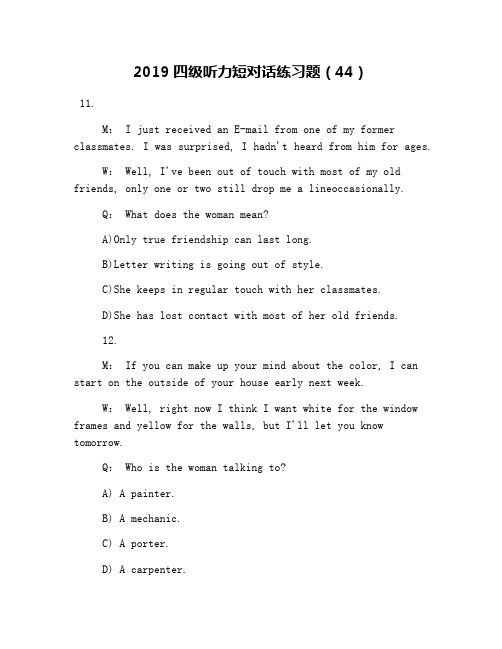
2019四级听力短对话练习题(44)11.M: I just received an E-mail from one of my former classmates. I was surprised, I hadn't heard from him for ages.W: Well, I've been out of touch with most of my old friends, only one or two still drop me a lineoccasionally.Q: What does the woman mean?A)Only true friendship can last long.B)Letter writing is going out of style.C)She keeps in regular touch with her classmates.D)She has lost contact with most of her old friends.12.M: If you can make up your mind about the color, I can start on the outside of your house early next week.W: Well, right now I think I want white for the window frames and yellow for the walls, but I'll let you know tomorrow.Q: Who is the woman talking to?A) A painter.B) A mechanic.C) A porter.D) A carpenter.11.男:我刚刚收到了以前同学的电子邮件。
我很惊讶,我都好几年没跟他联系了。
四级听力短对话
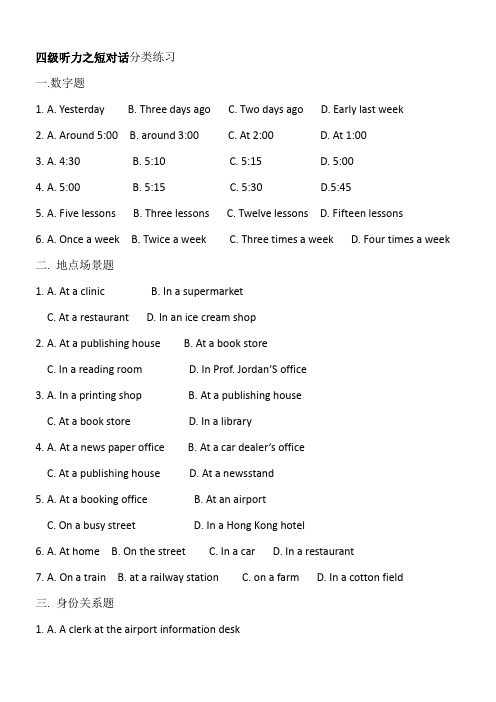
四级听力之短对话分类练习一.数字题1. A. Yesterday B. Three days ago C. Two days ago D. Early last week2. A. Around 5:00 B. around 3:00 C. At 2:00 D. At 1:003. A. 4:30 B. 5:10 C. 5:15 D. 5:004. A. 5:00 B. 5:15 C. 5:30 D.5:455. A. Five lessons B. Three lessons C. Twelve lessons D. Fifteen lessons6. A. Once a week B. Twice a week C. Three times a week D. Four times a week二. 地点场景题1. A. At a clinic B. In a supermarketC. At a restaurantD. In an ice cream shop2. A. At a publishing house B. At a book storeC. In a reading roomD. In Prof. Jordan’S office3. A. In a printing shop B. At a publishing houseC. At a book storeD. In a library4. A. At a news paper office B. At a car dealer’s officeC. At a publishing houseD. At a newsstand5. A. At a booking office B. At an airportC. On a busy streetD. In a Hong Kong hotel6. A. At home B. On the street C. In a car D. In a restaurant7. A. On a train B. at a railway station C. on a farm D. In a cotton field三. 身份关系题1. A. A clerk at the airport information deskB. A clerk at the railway station information deskC. A policemanD. Taxi driver2. A. A math teacher and his colleague B. A teacher and his studentC. A student and his classmateD. A librarian and a student3. A. His father B. His motherC. His brotherD. His sister4. A. Teacher and student B. Doctor and patientC. Manager and office workerD. Travel agent and customer5. A. A shop assistant B. A telephone operatorC. A waitressD. A clerk6. A. A guest and a receptionist B. A passenger and an air hostessC. A customer and a shop assistantD. A guest and a waitress四. 谈话主旨题1. A. A tragic accident. B. A sad occasion.C. Smith’s unusual life story.D. Smith’s sleeping problem.2. A.The traffic. B. The weather C. Their health D. Their time-table3. A. The necessity of writing to Mr. Johnson.B. Who is going to contact Mr. Johnson.C. The arrangement of the Wednesday meeting.D. Where they are going to meet Mr. Johnson.4. A. The woman does her own housework.B. The woman needs a housekeeper.C. The woman’s house is in a mess.D. The woman works as a housekeeper.5. A. The woman did not feel any danger growing up in the Bronx.B. The man thinks it was quite safe living in the Bronx district.C. The woman started working at an early age to support her family.D. The man doesn’t think it safe to send an 8-year-old to buy things.6. A. He has a strange personality.B. He’s got emotional problems.C. His illness is beyond cure.D. His behavior is hard to explain.7. A. He turned suddenly and ran into a tree.B. He’s got emotional problem.C. He drove too fast and crashed inot a truck.D. He was trying to overtake the truck ahead of him.8. A. Talking about sports.B. Writing up local news.C. Reading newspapers.D. Putting up advertisements.五. 因果关系题1. A. She came on food instead of taking a bus.B. She took somebody to hospital.C. Something prevented her from catching the bus.D. Something went wrong with the bus.2. A. He must meet his teacher.B. He must attend a class.C. He must go out with his girlfriend.D. He must stay at school to finish his homework.3. A. To make the woman angry.B. To please the man’s mother.C. David is the man’s good friend.D. David is good at carrying on conversations.4. A. Because he can’t stand football.B. Because Maria fell ill.C. Because he didn’t have the time.D. Because Maria doesn’t like football.5. A. She feels that he won’t accept anything.B. She’s sure he already has a pocket calculator.C. She thinks he has almost everyting he wants.D. She’s afraid he wants more than she can afford.6. A. She got up later than usual.B. The bus was late.C. She forgot she had class.D. Her clock was slow.7. A. Do her homework.B. Clean the backyard.C. Wash clothes.D. Enjoy the beautiful day.六.观点态度题1. A. The man doesn’t have money for his daughter’s graduate studies.B. The man does n’t think his daughter will get a business degree.C. The man insists that his daughter should pursue her studies in science.D. The man advises his daughter to think carefully before making her decision.2. A. They should n’t change their plan.B. They’d better change their mind.C. The tennis game won’t last long.D. Weather forcasts are not reliable.3. A. The man should not dream of being a superstar.B. The man did n’t practice hard enough.C. The man should find a new partner.D. The man should not give up.4. A. The next bus is coming soon.B. The bus will wait a few minutes at the stop.C. There are only two or three passengers waiting for the bus.D. The can catch this bus without running.5. A. Her car can’t stand any crash.B. Her car is kept in good condition.C. Her car isn’t as good as his.D. Her car is maintained as well as his.6. A. They are rewarding. B. They are entertaining.C. They are boring.D. They are time-consuming.7. A. He doesn’t care much about it.B. He enjoys it very much.C. He doesn’t mind even though it’s tedious.D. He hates working overtime.七. 行动计划题1. A. To pick up the woman from the library.B. To make a copy of the schedule for his friend.C. To find out more about the topic for the seminar.D. To get the seminar schedule for the woman.2. A. Help the company recruit graduate students.B. Visit the electronics company next week.C. Get a part-time job on campus before graduation.D. Apply for a job in the electronics Company.3. A. He will return from Paris in two weeks.B. He is studying French in Paris.C. He is ahving a vacation in Paris.D. He is planning to go back to Paris a year.4. A. He is going to give a talk on fishing.B. He is eager to meet Susan’s parents.C. He has the same hobby as Susan’s father.D. He thinks fishing is a good way to kill time.5. A. Move to a big city. B. Work in New York.C. Go back to school.D. Become a teacher.6. A. Wait for a taxi. B. Busy some food.C. Go on a trip.D. Book train tickets.7. A. She read it selectively. B. She went over it chapter by chapter.C. She read it slowly.D. She finished it at a stretch.8. A. He enjoys letter writing.B. He is asking the woman for help.C. He wants to get a new position.D. He has left the woman a good impression.9. A. She plans to go to graduate school.B. She will drop out of school.C. She will stop working and concentrate on her studies.D. She will take a part-time job.10. A. Looking for a timetable. B. Buying some furniture.C. Reserving a table.D. Window shopping.八. 习语词汇题1. A. No, all the rooms are taken. B. Yes, there is a double room.C. Yes, there are some spare roomsD. Yes, there is a single room.2. A. The train is crowded.B. The train is late.C.The train is empty.D. The train is on time.3. A. Jame is looking for a summer job.B. Jane is packing for the summer vacation.C. Jane is on her way home.D. Jane is eager to go home for the vacation.4. A. A waitor. B. A teacher C. A reporter. D. A student.5. A. Some students at the back cannot hear the professor.B. The professor had changed his reading assignment.C. Some of the students are not on the professor’s list.D. The professor has brought extra copies of his assignment.6. A. He was kept in hospital for a long time.B. He was slightly injuried in a traffic accident.C. He was seriously wounded in a mine explosion.D. He was fined for speeding.7. A. This apple pis tastes very good.B. His mother likes the pie very much.C. This pie can’t match his mother’s.D. His mother can’t make apple pie.8. A. By car. B. By bus. C. By plane. D. By train.9. A. Detective stories. B. Stories about jail escapes.C. Love stories.D. Stories about royal families.10. A. The furniture he bought was very cheap.B. The furniture apartment was inexpensive.C. The furniture in the market was on sale every Sunday.D. The apartment was provided with some old furniture.九. But 题1. A. She can use his car. B. She can borrow someone else’s car.C. She must get her car fixed.D. She can’t borrow his car.2. A. The digital TV system will offer different programs.B. He is eager to see what the new system is like.C. He thinks it unrealistic to have 500 channels.D. The new TV system may not provide anything better.3. A. The speakers want to rent the Smiths’ old house.B. The man lives two blocks away from the Smith.C. The woman is not sure if she is on the right street.D. The Smiths’ new house is not far from their old one.4. A. He wants to have more sleep.B. His wife doesn’t sleep well.C. Women need more sleep than men.D. He doesn’t need as much sleep as his wife.5. A. The woman does not want to go to the movies.B. The man is too tired to go to the movies.C. The woman wants to go to the movies.D. The man wants to go to the movies.6. A. By bus. B. By bike. C. By taxi D. On foot.7. A. The woman rejected the man’s apology.B. The woman appreciated the man’s offer.C. The man had forgotten the whole thing.D. The man had hurt the woman’s feelings.8. A. The weather forecast says it will be fine.B. The weather doesn’t count in their plan.C. They will not do as planned in case of rain.D. They will postpone their program if it rains.十. 建议请求题1. A. Give his ankle a good rest. B. Treat his injury immediately.C. Continue his regular activities.D. Be careful when climbing steps.2. A. Review the details of all her lessons.B. Compare notes with his classmates.C. Talk with her about his learning problems.D. Focus on the main points of her lectures.3. A. Teaching her son by herself. B. Having confidence in her son.C. Asking the teacher for extra help.D. Telling her son not to worry.4. A. They go to the seaside . B. They set off early.C. They go sightseeing.D. They wait for a fine day.5. A. Wear a new dress. B. Attend a party.C. Going shopping .D. Make a silk dress.6. A. The exam was easier than the previous one.B. Joe is sure that he will do better in the next exam.C. Joe probably failed in the exam.D. The oral part of the exam was easier than the written part.7. A. The woman has been complaining too much.B. The woman’s headache will go away by itself.C. The woman should have seen the doctor earlier..D. The woman should confirm her appointment with the doctor. 十一.虚拟语气题1. A. The woman has trouble getting along with the professor.B. The woman regrets having taken up much of the professor.C. The woman knows the professor has been busy.D. The woman knows the professor has run into trouble.2. A. He doesn’t enjoy business trips as much as he used to.B. He doesn’t think he is capable of doing the job.C. He thinks the pay is too low to support his family.D. He wants to spend more time with his family.3. A. It’s quiet in the restaurant.B. The price is high in the restaurant.C. The restaurant serves good food.D. The restaurant is too far from their school.4. A. They went a long way to attend the party.B. They didn’t think much of the food and drinks.C. They knew none of the other guests at the party.D. They enjoyed the party better than the other guests.5. A. The man didn’t want the woman to have her hair cut.B. The woman followed the man’s advice.C. The woman is wearing long hair now.D. The man didn’t care if the woman had her hair cut or not.十二. 否定关系题1. A. Extremely tedious. B. Hard to understand.C. Lacking a good plot.D. Not worth seeing twice.2. A. He is taking care of his twin brother. B. He had been feeling ill all week.C. He is worried about Rod’s health .D. He has been in perfect condition.3. A. He needs another job as research assistant.B. He asked Professor Williams for assistanceC. He assists Professor Williams with his teaching.D. He is doing research with Professor Williams.4. A. Dr. Andrews has been promoted for his thoroughness.B. She disagrees with Dr. Andrews on many occasions.C. Dr. Andrew used to keep his patients waiting.D. She dislikes Dr. Andrews as much as the new physician.5. A. The woman has to get the textbooks in other ways.B. The woman has sold her used textbooks to the bookstore.C. The man is going to buy his textbooks to from a bookstore.D. The man doesn’t want to sell his textbooks to the woman.6. A. Jimmy will regret marrying a Frenchwoman.B. Jimmy is rich enough to buy a big house.C. Jimmy is not serious in making decisionsD. Jimmy’s words are often not reliable.7. A. Cold and windy. B. Snow will be replaced by strong winds.C. It will get better .D. Rainy and cold.8. A. Skating. B. Swimming.C. Boating and swimmingD. Boating and skating.十三. 比较结构题1. A. It was a long lecture, but easy to understand.B. It was not as easy as she had though.C. It was as difficult as she had expected.D. It was interesting and easy to follow.2. A. By car. B. By bus. C. By plane. D. By train.3. A. More than an hour and a half. B. Not more than half an hour.C. More than two hours.D. Less than an hour and a half.4. A. He wishes to have more courses like it.B. He finds it hard to follow the teacher.C. He wishes the teacher would talk more.D. He doesn’t like the teacher’s accent.5. A. The 2:00 train will arrive earlier.B. The 2:30 train has a dining car.C. The woman prefers to take the 2:30 train.D. They are going to have some fast food on the train.。
2019四级听力短对话练习题(47)
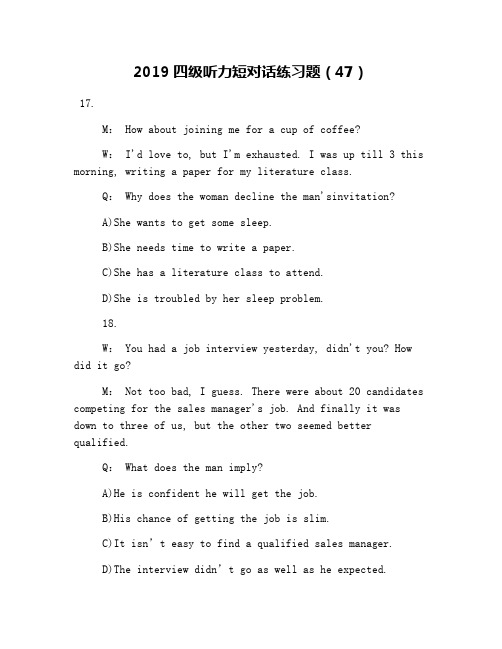
2019四级听力短对话练习题(47)17.M: How about joining me for a cup of coffee?W: I'd love to, but I'm exhausted. I was up till 3 this morning, writing a paper for my literature class.Q: Why does the woman decline the man'sinvitation?A)She wants to get some sleep.B)She needs time to write a paper.C)She has a literature class to attend.D)She is troubled by her sleep problem.18.W: You had a job interview yesterday, didn't you? How did it go?M: Not too bad, I guess. There were about 20 candidates competing for the sales manager's job. And finally it was down to three of us, but the other two seemed better qualified.Q: What does the man imply?A)He is confident he will get the job.B)His chance of getting the job is slim.C)It isn’t easy to find a qualified sales manager.D)The interview didn’t go as well as he expected.17.男:和我一块儿喝杯咖啡吗?女:我很想,但是我实在是太累了。
2019大学英语四级听力短对话练习题(46)

2019大学英语四级听力短对话练习题(46)15.W: I really like those abstract paintings we sawyesterday. What do you think?M: I guess it's something I haven't acquired a tastefor yet.Q: What does the man imply?A) The woman possesses a natural for art.B) Women have a better artistic taste than men.C) He isn’t good at abstract thinking.D) He doesn’t like abstract paintings.16.W: You haven't seen a blue notebook, have you? I hope I didn't leave it in the reading room.M: Did you check that pile of journals you've borrowed from the library the other day?Q: What is the man trying to say to the woman?A) She couldn’t have left her notebook in the library.B) she may have put her notebook amid the journals.C) she should have made careful notes while doing reading.D) she shouldn’t have read his notes without his knowing it.15.女:我特别喜欢昨天咱们看到的那些抽象画。
四级听力练习-短对话
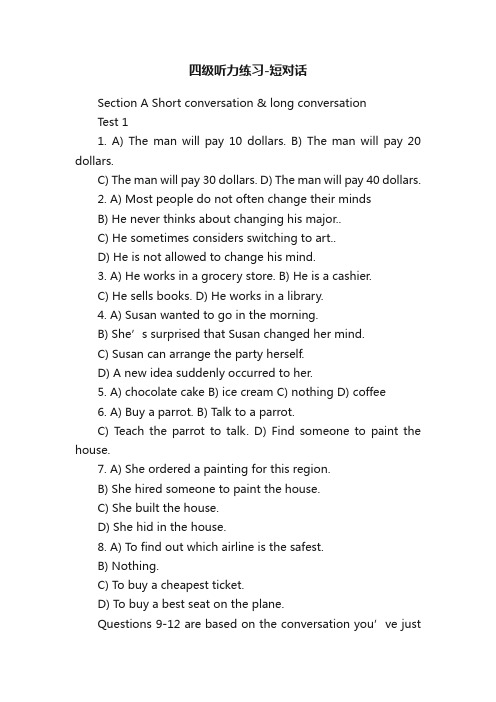
四级听力练习-短对话Section A Short conversation & long conversationTest 11. A) The man will pay 10 dollars. B) The man will pay 20 dollars.C) The man will pay 30 dollars. D) The man will pay 40 dollars.2. A) Most people do not often change their mindsB) He never thinks about changing his major..C) He sometimes considers switching to art..D) He is not allowed to change his mind.3. A) He works in a grocery store. B) He is a cashier.C) He sells books. D) He works in a library.4. A) Susan wanted to go in the morning.B) She’s surprised that Susan changed her mind.C) Susan can arrange the party herself.D) A new idea suddenly occurred to her.5. A) chocolate cake B) ice cream C) nothing D) coffee6. A) Buy a parrot. B) Talk to a parrot.C) Teach the parrot to talk. D) Find someone to paint the house.7. A) She ordered a painting for this region.B) She hired someone to paint the house.C) She built the house.D) She hid in the house.8. A) To find out which airline is the safest.B) Nothing.C) To buy a cheapest ticket.D) To buy a best seat on the plane.Questions 9-12 are based on the conversation you’ve justheard.9. A) A vacation trip to Yellowstone Park.B) A lecture by a visiting professor.C) Her biology thesis.D) A research project.10. A) More buffalo(北美野牛)are surviving the winter.B) Fewer buffalo are dying of disease.C) More buffalo are being born.D) Fewer buffalo are being killed by hunters.11. A) She is from Wyoming.B) She needs the money.C) She has been studying animal diseases.D) Her thesis adviser is heading the project.12. A) Collecting information about the bacteria(细菌).B) Working on a cattle ranch.C) Writing a paper about extinct(灭绝的)animals.D) Analyzing buffalo behavior.Questions 13-15 are based on the conversation you’ve just heard.13. A) The presence of life-forms far below the Earth’s surface.B) The risk of infection(感染) from rare strains of bacteria.C) Fictional(虚构的) representations of a hidden underground world.D) The reliability of evidence collected by new drilling methods.14. A) Its textureB) Its sizeC) Its preservation(保存,储藏)D) its shape15. A) The bacteria would be killed by the human immune system.B) The bacteria would die if brought to the surface.C) Many antidotes(解药,对抗手段) and remedies are available.D) Drilling operations are always closely monitored.Test 21. A) She can tell Joan when she sees her at noon.B) She should tell Joan’s brother about the reception.C) She must call on Joan after the reception.D) She may see Joan’s brother at lunch.2. A) He went to see his schoolmate.B) He went to see a film with his friend.C) He watched television with his friend.D) He stayed at home talking with his friend.3. A) A busB) A taxiC) NewspaperD) Better weather4. A) The cinema is made of stone.B) The cinema is very popular.C) The cinema is very near.D) The cinema is very large.5. A) At 8:30B) Until 7:00C) About 45 minutesD) About an hour and a half6. A) He is hostile.B) He is indifferent.C) He is helpful.D) He is snobbish(势利的).7. A) He is unhappy.B) He is worried.C) He is very much satisfied.D) He is fairly pleased.8. A) She doesn’t have a job.B) She doesn’t get enough sleep now.C) She is already very busy.D) Sh e doesn’t have enough money.Questions 9-12 are based on the conversation you’ve just heard.9. A) They may not be able to take their vacation.B) It may snow during their vacation.C) They are going to need more money.D) They may miss graduation.10. A) They are going skiing.B) Their plans include other friends.C) They will drive together.D) Their reservations have been canceled.11. A) Because of the possibility of bad weather.B) Because of the faculty’s contracts.C) Because of the summer schedule of classes.D) Because of the date for graduation.12. A) He might lose his financial aid.B) He doesn’t want to attend summer classes.C) He had already missed too many.D) He’s afraid he might not graduate.Questions 13-15 are based on the conversation y ou’ve just heard.13. A) The students needed off – campus jobs.B) The theater department needed more talented students.C) The opera company was looking for volunteers.D) The new dean thought it would provide good experience for the students.14. A) Work with an opera troupe(剧团).B) Work part – time for the dean.C) Perform on the radioD) Submit their suggestions to the dean.15. A) A good singing voice.B) A commitment to the project for two semesters.C) An academic concentration in theater arts.D) A certain grade point average.Test 31. A) Worried and frightenedB) Very relaxedC) Quite unhappyD) Angry with the professor2. A) Place another orderB) Call to check on itC) Wait patientlyD) Go and find the furniture.3. A) 5:00B) 5:15C) 5:30D) 5:454. A) He has to study.B) He has to work.C) He has an appointment.D) He doesn’t want to.5. A) It was a rather easy course.B) Mike used to eat a lot.C) Mike found it difficult to keep up.D) Mike was the worst in class.6. A) Paper plates.B) Plastic forks.C) Beer and punch.D) Knives and spoons.7. A) It was pulled down.B) It was rebuilt.C) It was renovated(修复).D) It was newly built.8. A) At a supermarketB) At a barC) At a libraryD) At a dormitory.Questions 9-12 are based on the conversat ion you’ve just heard.9. A) Collecting objects on the beach.B) Creating computer models.C) Mapping currents in the ocean.D) Tracking water pollution.10. A) An interesting piece of woodB) An old shoeC) A message inside a bottleD) An unusual shell11. A) ChemicalsB) bottlesC) Athletic shoesD) Model boats12. A) A storm can change the direction of an ocean current.B) Common items can be works or art.C) Not all useful experiments are planned ahead of time.D) Computers cannot always predict the effects of pollution. Questions 13-15 are based on the conversation you’ve just heard.13. A) How to increase one’s speed in a bicycle race.B) Major Canadian bicycle races.C) The contribution of cycling to health.D) An annual cycling event.14. A) The length of the course.B) The route the cyclists take.C) The number of participants.D) The month in which the tour is held.15. A) They are not competing with each other.B) They have to pay a high fee.C) They tend to be beginning cyclists.D) Most of them fail to finish the route.。
四级听力小对话练习题
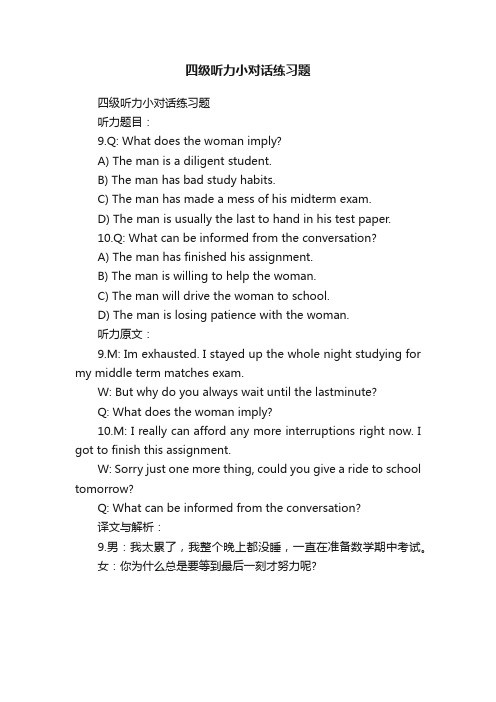
四级听力小对话练习题四级听力小对话练习题听力题目:9.Q: What does the woman imply?A) The man is a diligent student.B) The man has bad study habits.C) The man has made a mess of his midterm exam.D) The man is usually the last to hand in his test paper.10.Q: What can be informed from the conversation?A) The man has finished his assignment.B) The man is willing to help the woman.C) The man will drive the woman to school.D) The man is losing patience with the woman.听力原文:9.M: Im exhausted. I stayed up the whole night studying for my middle term matches exam.W: But why do you always wait until the lastminute?Q: What does the woman imply?10.M: I really can afford any more interruptions right now. I got to finish this assignment.W: Sorry just one more thing, could you give a ride to school tomorrow?Q: What can be informed from the conversation?译文与解析:9.男:我太累了,我整个晚上都没睡,一直在准备数学期中考试。
- 1、下载文档前请自行甄别文档内容的完整性,平台不提供额外的编辑、内容补充、找答案等附加服务。
- 2、"仅部分预览"的文档,不可在线预览部分如存在完整性等问题,可反馈申请退款(可完整预览的文档不适用该条件!)。
- 3、如文档侵犯您的权益,请联系客服反馈,我们会尽快为您处理(人工客服工作时间:9:00-18:30)。
2019英语四级听力短对话练习题(42)
15.
W: I heard about your promotion, you must be thrilled.
M: Not really, the new office is huge, but the work load has doubled.
Q: What do we learn about the man from theconversation?
A) He is pleased with his exciting new job.
B) He finds the huge workload unbearable.
C) He finds his office much too big for him.
D) He is not so excited about his new position.
16.
W:I can’t decide what to do about the party tomorrow.
M:You don’t have to go if you don’t want to, but
I’ll be glad to give you a ride if you do.
Q: What do we learn from the conversation?
A) The woman is going to hold a big party tomorrow.
B) The man has no idea what the right thing to do is.
C) The woman doesn’t know how to get to the party.
D) The man offers to drive the woman to the party.
15.
女:我听说你升职了,你一定很高兴吧。
男:那倒不是,新办公室很大,但是工作量也加倍了。
问:从对话中我们能得到男人的什么信息?
答:女人问男人升职是不是很高兴,从男人回答的not really
判断出,他并不是那么高兴,后面也提到工作量加倍,可想而知,男
人对提升这件事并不是很兴奋。
所以准确答案为D,他对新职位的反应不是很兴奋。
A项意思相反,B、C两项未提及。
16.
女:我不知道明天的派对要怎么办。
男:如果你不想去,那就别去了。
不过如果你打算去的话,我很
乐意载你一程。
问:从对话中我们能得到什么信息?
答:男人的话中清楚地说到送女人一程的提议,所以准确答案为D,男人提出开车送女人去派对。
A项,从男人提出送女人去派对得知,女人是去参加派对,而不是举行派对,所以排除。
B项,未提及。
C项,女人说不知道派对要怎么办,但是并未说具体的事情,不能确切得知
女人是在为不知道如何去派对苦恼,所以排除。
